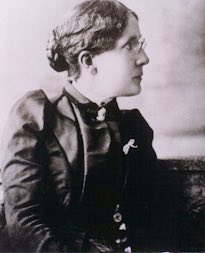Frances Willard, founder of the World’s Woman’s Christian Temperance Union, influenced the history of reform and helped transform the role of women in nineteenth-century America.
After graduating from Nortwestern Female College in 1859, Willard became a leading educator, teaching at a number of schools in Illinois, Pennsylvania, and New York before becoming, in 1871, the first female president of a college granting degrees to women – the newly-formed Evanston College for Ladies. After the college merged with Northwestern University, Willard became the first Dean of Women and Professor of Aesthetics. In 1873, she helped found the Association for the Advancement of Women.
Willard left education for work in temperance in 1874. In that year, the Woman’s Christian Temperance Union (WCTU) was founded with Willard as the first corresponding secretary. In 1879, she would become its second president. For Willard, the WCTU was an effective school for women, giving them a chance to achieve identities beyond those of wives and mothers. The WCTU, with Willard was president, became the largest organization of women in the United States. At WCTU meetings, women followed parliamentary procedures; they assumed leadership roles and learned to use their skills to achieve many different goals. Willard, herself, traveled throughout the nation, lectured, wrote books, and edited WCTU publications.
In 1883, Willard helped found the World’s Woman’s Christian Temperance Union.
Willard also influenced the suffrage movement. She urged suffragists to work on the local level to achieve the vote rather than focus all their energies
on a constitutional amendment. Such a strategy won numerous gains. Moreover, Willard convinced many reluctant women to support the suffrage movement, so they could use the power of the vote to make and keep their towns dry and improve the moral fiber of America.
In addition to temperance and suffrage, under Willard’s leadership the WCTU supported broad social reforms such as equal pay for equal work, the eight-hour work day, Armenian relief, world peace, the protection of women and children in the workplace, kindergartens, mothers’ clubs (the forerunner of the PTA), dress reform, jail reform, uniform marriage and divorce laws, and physical education in grade schools. The WCTU established homes for working girls, shelters for abused women and children, and free kindergartens. In addition, Willard was a founding member of the Illinois Woman’s Press Association, one of the first five women elected to the Methodist General Conference, and a founder and first
president of the National Council of Women.
For nineteen years as WCTU president, Willard promoted unlimited aspirations for women: higher education, choice of vocation, and equality of opportunity along with suffrage and temperance.

